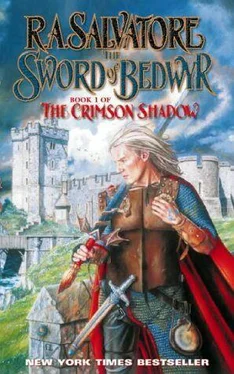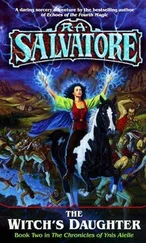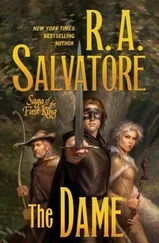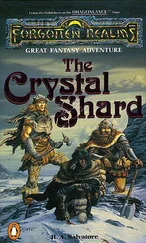They went up a tight stairway, and then up another, and found a passage leading to an arched passageway that overlooked the cathedral’s nave fully fifty feet up from the main area’s floor.
“The triforium,” Oliver explained with a sly wink, apparently believing that they would get a good view of the proceedings in relative safety.
They were fifty feet up from the floor, Luthien noted, and barely halfway to the network of huge vaulting that formed the structure’s incredible roof. Again the young Bedwyr felt tiny and insignificant, overwhelmed by the sheer size of the place.
Oliver was a couple of steps ahead of him by then, and turned back, realizing that Luthien wasn’t following.
“Quickly,” the halfling whispered harshly, drawing Luthien back to the business at hand.
They scampered along the back side of the triforium wall. On the front side of the passageway, centering every arch, was a relatively new addition to the cathedral, a man-sized, winged gargoyle, its grotesque and horned head looking down over the ledge, looking down upon the gathering. Oliver eyed the statues with obvious distaste, and Luthien heartily concurred, thinking the gargoyles a wretched stain upon a holy church.
They crept along quietly to the corner of the triforium, where the passageway turned right into the southern transept. Diagonally across the way, Luthien saw the pipes of a gigantic organ, and beneath them the area where the choir had once stood, singing proud praises to God. Now cyclopians milled about in there.
The altar area was still perhaps a hundred feet away, tucked into the center of a semicircular apse at the cathedral’s eastern end. The bulk of this apse was actually in Montfort’s lower section, forming part of the city’s dividing wall.
Luthien’s eyes were first led upward by the sweeping and spiraling designs of the apse, up into the cathedral’s tallest spire, he realized, though from this angle, he could not see more than halfway up the towering structure. He shook his head and looked lower to the great tapestries of the apse, and to the altar.
There, Luthien got his first good look at the infamous Duke Morkney of Montfort. The old wretch sat in a comfortable chair directly behind the altar, wearing red robes and a bored expression.
At a podium at the corner of the apse stood the roll-caller, a fierce-looking man flanked by two of the largest cyclopians Luthien had ever seen. The man read a name deliberately, then paused, waiting for the called taxpayer—a tavern owner in the lower section whom Luthien recognized—to shuffle out of one of the high-backed wooden pews in the nave and amble forward with his offering.
A sour taste filled Luthien’s mouth when the summoned man handed a bag of coins over to a cyclopian. The merchant stood, head bowed, while the bag was emptied onto the altar, its contents quickly counted. The amount was then announced to Morkney, who paused a moment—just to make the merchant sweat, Luthien realized—then waved his arm absently. The merchant verily ran back to his pew, gathered up the two children who had come in with him, and scooted out of the Ministry.
The process was repeated over and over. Most of the taxpayers were allowed to go on their way, but one unfortunate man, an old vendor from a kiosk in the market, apparently had not given enough to suit the greedy duke. Morkney whispered something to the cyclopian at his side, and the man was promptly dragged away. An old woman—his wife, Luthien assumed—leaped up from a pew, wailing in protest.
She was dragged off also.
“Pleasant,” Oliver muttered at Luthien’s side.
About halfway through the tax call, two hours after Luthien and Oliver had found their high perch, Morkney raised one skinny hand. The man at the lectern stepped down and another took his place.
“Prisoners!” this new caller yelled, and a group of cyclopians rose and stepped out from the first pew, pulling the chained men, women, and dwarves along with them.
“There is our savior,” Oliver remarked dryly, noting the bushy-haired dwarf. “Have you any idea of how we might get near to him?”
The obvious sarcasm in Oliver’s tone angered Luthien, but he had no response. To his dismay, it seemed that the halfling was right. There was nothing he could do, nothing at all. He could see at least two-score cyclopians in the cathedral and did not doubt that another two-score were nearby, not counting the ones in the wagons beyond the door of the north transept. That, plus the fact that Morkney was reputedly a powerful wizard, made any plan to spring Shuglin seem utterly ridiculous.
Charges were read and the nine prisoners were given various punishments, various terms of indenture. The four men would accompany a caravan to Princetown—likely to be sold off to the army once they reached the Avon city, Oliver informed Luthien. The three women were sentenced to serve as house workers for various merchants, friends of the duke—Oliver did not have to explain their grim fate. And the dwarves, predictably, were given long terms at hard labor in the mines.
Luthien Bedwyr watched helplessly as Shuglin was pulled away down the north transept and out the side door to a waiting wagon.
The tax call soon began anew, and Oliver and the fuming Luthien made their way back along the triforium to the hidden corridor and down to the ledge overlooking the foyer. They let one released merchant go out, then slipped down into the small narthex. Oliver retrieved his grapnel and slipped it away, then adjusted his veils and motioned for Luthien to lead the way.
The cyclopian guards made some nasty comment as the “merchant” and his virgin daughter stepped between them, but Luthien was hardly listening. He didn’t say a word all the way back to Tiny Alcove, and then paced the apartment like a caged dog.
Oliver, still in his maiden’s garb, remarked that midday was almost upon them and the Dwelf would soon be open, but Luthien gave no indication that he heard.
“There was not a thing you could do!” Oliver finally shouted, hopping up to stand on a chair in Luthien’s pacing path so that he could shout in the man’s face. “Not a thing!”
“They took him to the mines,” the burdened young man remarked, turning back on his heels and ignoring the ranting halfling. “Well, if they took Shuglin to the mines, then I go to the mines.”
“By all the virgins of Avon,” Oliver muttered under his breath, and he sat forcefully down in the chair and pulled the long black hair of his wig over his eyes.
Oliver and Luthien waited for more than an hour, crouched among a tumble of boulders in the rocky foothills just a quarter of a mile outside Montfort’s southern wall, overlooking the narrow trail which led to the mines. Riverdancer and Threadbare, glad to be out of the city, grazed in a small meadow not far away. Oliver had explained that the slaver wagon would not leave the city until the tax calls were completed—in case Morkney found some other “volunteers” who preferred to work in the mines rather than pay their heavy tithes.
Luthien had planned to hit the wagon here, long before it got to the mine; Oliver knew better.
The young Bedwyr’s expression fell considerably when the wagon came bouncing along, escorted by a score of cyclopians riding fierce ponypigs.
“Now can we go to the Dwelf?” the weary halfling asked, but from the determined way angry Luthien stormed off to retrieve his mount, Oliver guessed the answer.
They trotted along the road a good distance behind the wagon, but sometimes catching sight of it far ahead on the rocky trail as it came out along an open ledge.
“This is not so smart a thing,” Oliver said many times, but Luthien didn’t reply. Finally, with more than three miles of trail behind them, the halfling stopped Threadbare. Luthien went on for about twenty yards, then turned Riverdancer about and looked back accusingly at his friend.
Читать дальше









